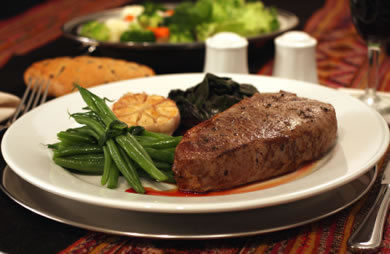By TONKA14,
SparkPeople Blogger
7/6/2009
A European Mediterranean eating style is considered a healthy way to eat by many health professionals. One primary reason is because of its plant based focus as well as that it is low in refined sugar and preservatives. These are very different eating patterns compared to the typical American diet.
Harvard School of Public Health researchers and the University of Athens Medical School in Greece spent more than eight years investigating over 23,000 Greek men and women. The men and women were participating in the European Prospective Investigation into Cancer and Nutrition (EPIC) which looked at overall health related to Mediterranean diet adherence. The researchers found that some food choice patterns provided more health benefit than others. Which foods were more beneficial?
Analysis found that certain foods were more predictive of lower mortality while others had little to do with improving health. While the study tended to identify specific foods from the participants diets that provided a health benefit, perhaps for most of us there is a larger take away. Instead of looking at specific foods that could provide benefit, identifying dietary patterns to include most often could provide the best health benefit of all.
Here are the top 8 food types that could benefit your health if you include them regularly in your diet. - Olive Oil - Mediterranean cooking routinely includes olive oil which is rich in monounsaturated fat which is a healthy type of fat. Moderation with any fat is recommended even with healthier choices like olive oil and canola oil.
- Vegetables and fruits - The European Mediterranean eating style is rich in vegetables along with some fruits which may be key its health benefits. While both vegetables and fruits are lower calorie, low fat, and fiber rich foods, including more vegetables than fruits can be key since they are typically lower in natural sugar which would provide a lower glucose response in the body compared to fruits. Including a large number of vegetables in your eating pattern and a few fruits are healthy goals for any eating style.
- Fish and seafood - Fish provides some of the healthiest meat protein sources to any eating style and are traditional components of the Mediterranean style of eating. It is best to limit deep fried fish and seafood, even in olive oil, in favor of broiled or grilled to maximize benefit. If fish and seafood are not a part of your weekly meat choices, including them in place of a serving of red meat is a good way to begin to increase these healthy options in your diet.
- Nuts - Nuts are a key food choice in the Mediterranean eating style. Nuts provide unsaturated fats and protein as well as calcium, potassium and fiber to the diet while lacking sugar. As I mentioned in my Could You Have Metabolic Syndrome? blog, research shows that a Mediterranean style diet enriched with nuts can help with risks of metabolic syndrome. While most nuts are beneficial, walnuts and almonds are the best choices to include regularly in the diet. Including a quarter cup serving each day is not difficult since nuts can easily be eaten as a snack, included in a chicken salad or trail mix or as a salad topping.
- Beans or pulses - Along with nuts and vegetables, beans such as chick peas could be some of the richest contributors to the healthy nature of the Mediterranean eating style. A wide variety of beans, chick peas, peas and lentils provide rich sources of protein, fiber and iron which are also low in fat and easy to include in soups, salads and sauces for pastas. A small half cup serving can go a very long way to enrich the diet. Aim to include one half cup serving daily whenever possible.
- Alcohol or at least part of it - While it is strongly advised that alcohol be included in a healthy diet only in moderation, numerous studies do point to red wines from the Mediterranean eating style as showing some health benefit. When you look at the studies a little closer you find that the compound resveratrol is what is seen as the positive agent especially related to heart health benefit. This same compound can also be found in red grapes and pomegranates. Including these foods in your diet regularly can provide heart health benefits without the alcohol.
- Cereals - Whole grain sources provide a great fiber source to a Mediterranean eating style. This is in stark contrast to the numerous sugar filled and highly processed options in the American eating style. Whole grain cereals provide a great vehicle for a fat free milk and fresh fruit serving as well and can be a great way to include complex carbohydrates in your diet.
- Dairy - One of the more controversial aspects of the traditional Mediterranean eating style is the limited milk intake. However, Greece, Italy and France are all high cheese and yogurt consumers from both goat and sheep dairy sources. If your diet is not rich in calcium sources, perhaps giving some Mediterranean style cheese and yogurt choices a try would be a good way to increase your daily dairy intake.
There is one aspect of the European Mediterranean eating style that isn't talked about a great deal. I think it is worth noting that this eating style that is held up as having health benefits also is as high or higher in overall fat than our typical American diet. Many traditional European Mediterranean eating patterns contain 35-40% of their total calories from fats. While fat does supply more calories per gram than carbohydrates or proteins, they also supply many other aspects that could be beneficial to this health eating style. Fat supplies essential fatty acids the body needs, carries and transports fat soluble vitamins like A, D, E and K, and helps the body use protein and carbohydrates efficiently.
So if they don't limit their fat intake, why is it so healthy? The traditional European Mediterranean eating style includes healthy monounsaturated fats from olive oil and polyunsaturated fats and Omega 3 fatty acids from canola oil, fish and nuts, particularly walnuts. At the same time, this eating style is low in saturated fats and hydrogenated oils/trans fats.
The Bottom Line - The European Mediterranean eating style is a healthy model for healthful eating. Regularly including olive and canola oil as the prominent fat source while including many vegetables, some fruits, a handful of nuts and beans, some resveratrol containing foods and cheeses and yogurt could be a healthy eating style for you as well. Another suggestion would be to pay less attention to limiting your total fat intake and more attention to limiting your saturated and hydrogenated Trans fat intake while maximizing the monounsaturated and polyunsaturated choices when you do include fats in the diet.
How European Mediterranean is your eating style? What can you change to improve it?
|
|















.jpg)